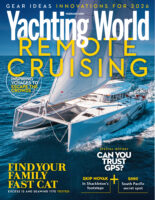Andy Robertson takes a look at the IRM season and reveals what’s in store next year
Through the whole of the domestic season IRM continued to proved excellent competition for a wide variety of race boats, and a busy calendar is planned for the 2003 season. While 2002 saw some important and exciting milestones passed, not least in proving that IRM can take centre stage at a major international regatta and maintain the interest of not just the IRM competitors, but it engaged the interest of other competitors from other classes, and a provided a valid and exciting focal point for the media.
The season opened with a well attended and close fought Warsash Spring Series and gathered pace when 14 boats contested the IRM class at the very successful Red Funnel Easter Regatta. The first major IRM trophy of 2002 was the Seatrack Trophy which went to the winner of the Round the Island race under IRM. Tim Louis and Kit Hobday’s young crew off the Farr 52 Bear of Britain had the Seatrack IRM Trophy to complement the top award for their class, IRC Class 1, the Vapho Trophy, in their trophy cabinet.
The Seatrack Trophy, presented by Peter Schofield of S&W (UK) Ltd was open to all boats racing in the Round the Island with a valid IRM certificate and the results, as expected, proved a little closer under IRM than IRC, but Bear of Britain’s sprint around the island in 5hrs:22 mins:53 seconds also translated to a relatively comfortable win under IRM. Five minutes and three seconds behind was Peter Morton’s Mills 50 Mandrake.
The IRM Nationals became a standalone championship regatta in its own right, with 14 boats racing over the Jubilee Bank Holiday Weekend. David McLean’s IC 45 Babbalaas emerged triumphant Babbalaas, with double Olympic medallist Ben Ainslie steering, Lou Varney on mainsheet and Mike Richards calling the shots did not win a race over a regatta which saw four different boats winning races, they were solid tactically and smoothest in their crew work, and sometimes enjoyed the benefit of sailing in clear air, ahead of the 40 footers and sufficiently behind the 50 footers to take all the advantages available. With 14 boats competing, the overall fleet could have been slightly bigger, but a rare but almost entirely universal consensus emanated from a handicap regatta: that it was quite simply the three best sailed boats which took the podium places. Indeed, had Robbie Cameron-Davies’ Ker 11.3 I-Site not suffered a mid regatta DSQ and so finished fourth overall, then it would have been the best boat from each of the 45, 50 and 40 foot group which populated the overall top three. ” It was a great regatta and a really good, strong start for IRM and I think at the end of it the best sailed, best prepared boats did the best. The opposition was very mixed in terms of the types of boats out there but IRM seemed not to favour any particular boat and seemed to work really well with just seconds in it at times.” Commented Babalaas’ owner David McLean.
The other major highlight was what some mysteriously refer to as ‘The Cork Experiment’. The essence of it was to remove the element of choice for owners of high performance race boats, and pro and semi pro crews, and corral them all together in one High Performance Class. It may not have been a step forward for human rights and freedom of choice, but we’ve yet to hear a dissenting voice. After all, as those far sighted disciples kept saying beforehand, in motor sports you are classified by the horsepower and performance of your car. Why should supposedly top end, race boat owners want to race under a handicap system which allows a race-bred rally car to go and race the equivalent of a souped up camper van? Regardless Ford Cork Week showed what IRM is capable of. A class of 20, from the Mumm 30s to the Farr 52s with a strong 40-45 foot posse of Ker 11.3s, Farr 40s and IC 45s.
In mainly light to moderate winds race wins were recorded by boats representing the best of all the size bands, and once again the top ten places were shared between boats of different sizes. Glyn Williams’ Wolf, the IC 45 triumphed with a largely amateur crew and the owner driving, ahead of Nick Hewson’s Farr 52 Team Tonic.
The class association is speaking to other major regattas and see this as a valid and important way forward, where the enjoyment for both the racers and the racer cruisers is substantially enhanced by keeping the classes apart. 2003 will inevitably be a testing year for IRM with no Ford Cork Week, and the Admirals Cup racing under IRC and IMS 600, taking the focus. Owners of IRM boats need to be prepared to support what promises to be an interesting and exciting programme which has been drawn up to ensure a full season of racing. Centrepiece is planned to be a regatta based from St Malo and/or Dinard in early July. The objective is also to run an IRM National Championship as a separate event on 24-26 May and to participate in the IR 2000 championships in early June. Team events also figure on the 2003 calendar with proposed return to Torbay for a revitalised Torbay Admiral’s Cup regatta under IRM in late August, and an IRM Team Championship, based on 3 IRM rating bands.



